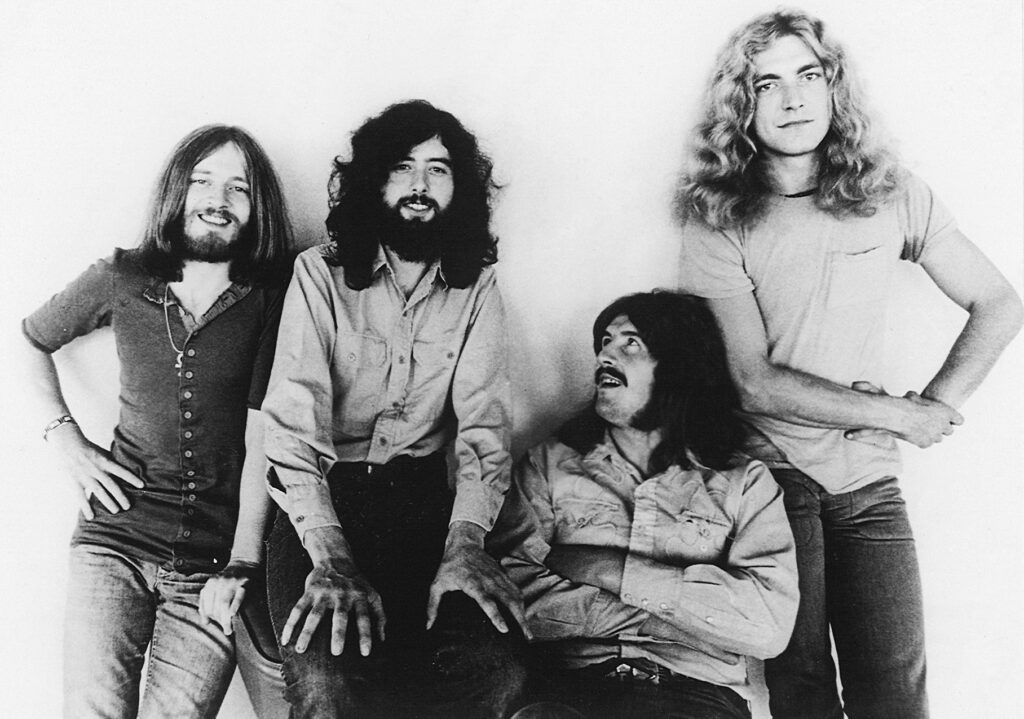
“The Forgotten Hippie Band That Captured Led Zeppelin’s Attention: ‘They Were Very Insistent on Giving Them a Platform to Succeed'”…
Led Zeppelin, the iconic architects of hard rock, dominated the 1970s with their electrifying performances and pioneering albums. But beneath the towering legend of Zeppelin lies a lesser-known story: their support of a little-known hippie band that captured their attention and briefly shared their stage. This forgotten group, steeped in the counterculture spirit of the era, owed much of their fleeting spotlight to Led Zeppelin’s unwavering insistence that they be given a chance.
The band in question, Stone the Crows, embodied the raw, soulful essence of the 1960s and early 1970s rock scene. Hailing from Glasgow, Scotland, they were fronted by the magnetic Maggie Bell, whose fiery, blues-infused vocals earned her comparisons to Janis Joplin.
Stone the Crows combined blues, rock, and a touch of psychedelia, creating a sound that resonated deeply with the countercultural ethos. However, despite their undeniable talent, they struggled to break through the saturated music scene.
Enter Led Zeppelin. By the early 1970s, Zeppelin was untouchable, a band whose word carried weight across the industry. They had just established their own label, Swan Song Records, and were using their clout to champion lesser-known acts.
While Stone the Crows never signed with Swan Song, they became a notable beneficiary of Zeppelin’s influence. Jimmy Page, an admirer of Bell’s powerful vocals and the band’s gritty authenticity, was particularly vocal in his support.
“They were very insistent,” recalled Peter Grant, Led Zeppelin’s formidable manager. “Jimmy and Robert [Plant] saw something special in Stone the Crows. They wanted to give them a platform.” This insistence manifested in concrete actions: Zeppelin invited Stone the Crows to open for them on several tour dates. These opportunities allowed the Scottish band to perform before massive crowds, exposing them to audiences they could have only dreamed of reaching on their own.
Stone the Crows had moments of brilliance during these performances. Maggie Bell’s searing vocals often left audiences mesmerized, and the band’s bluesy jams created an atmosphere that felt authentic and alive.
Their connection to Led Zeppelin boosted their credibility and gave them a chance to shine in an industry that was often brutal to newcomers. But while Zeppelin’s push brought Stone the Crows to the forefront briefly, it wasn’t enough to cement their place in rock history.
Part of the problem lay in timing and tragedy. In 1972, the band faced a devastating blow when their guitarist, Les Harvey, was electrocuted on stage during a performance. His death left the band reeling and robbed them of a key creative force.
Though they continued for a time, they struggled to regain their footing in the competitive rock world. By 1973, Stone the Crows disbanded, their potential unfulfilled.
Reflecting on the band’s trajectory, Maggie Bell once noted, “We had the talent, and we had the chance, thanks to Zeppelin.
But sometimes, life has other plans.” Indeed, while Stone the Crows didn’t achieve enduring fame, their brief association with Led Zeppelin remains a testament to the latter’s willingness to champion the underdog.
Led Zeppelin’s advocacy for Stone the Crows was not an isolated incident. The band was known for supporting their peers and giving opportunities to up-and-coming acts. Swan Song Records became a vehicle for this ethos, signing bands like Bad Company and The Pretty Things. But Stone the Crows stands out because their story highlights the ephemeral nature of success in the music industry.
Today, Stone the Crows is remembered, if at all, as a footnote in rock history—a band that could have been. Yet their story is also a reminder of Led Zeppelin’s generosity and influence beyond their music.
In an era defined by excess and competition, Zeppelin’s willingness to lift others up offers a glimpse of the camaraderie that underpinned the rock scene’s golden age.
Though their music never achieved the widespread acclaim of their mentors, Stone the Crows’ brief moment in the spotlight remains a legacy of its own. They were a band of immense promise, championed by the greatest rock band of the era, and for a fleeting time, their voices echoed alongside the thunderous roar of Led Zeppelin.







